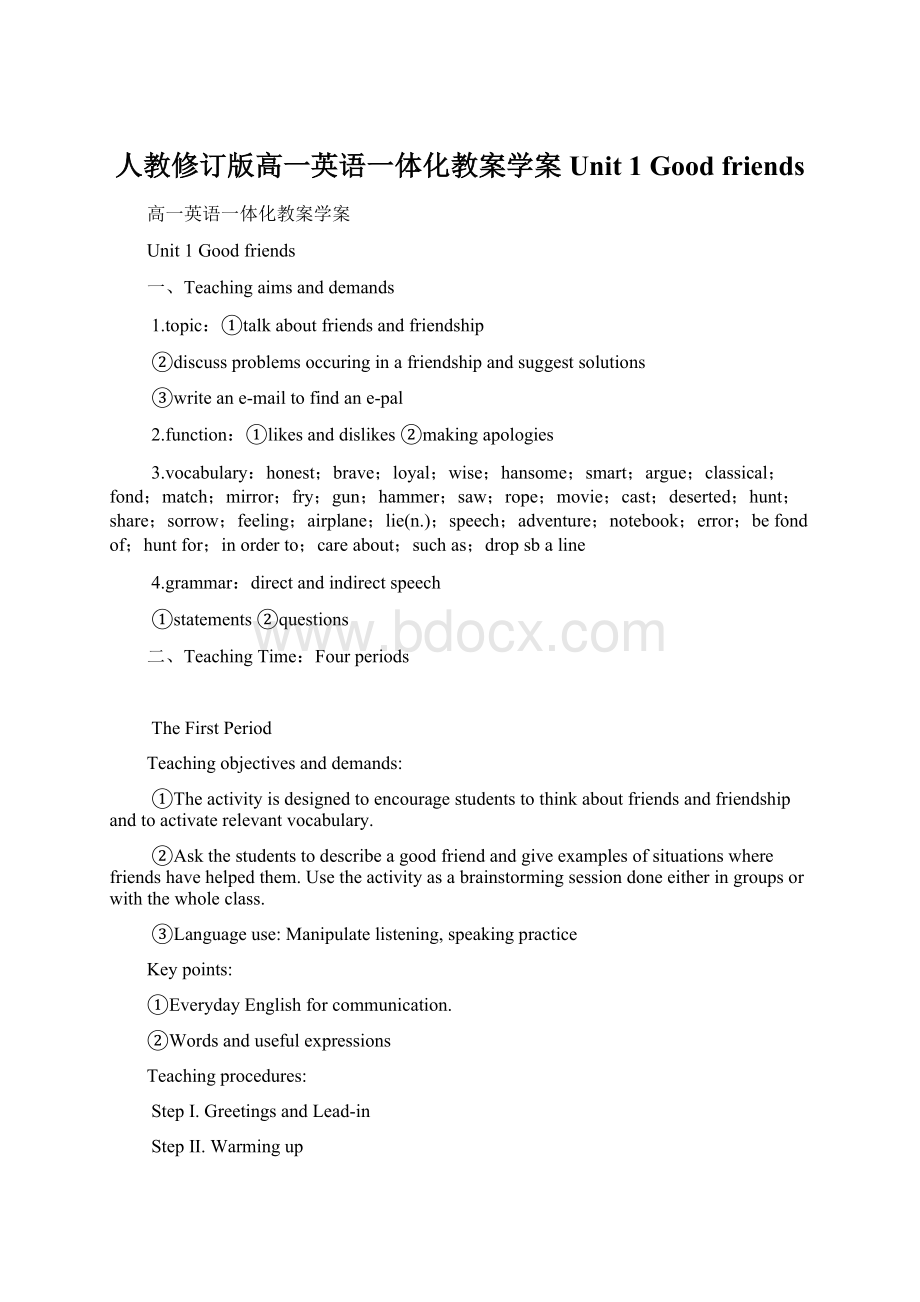人教修订版高一英语一体化教案学案Unit 1 Good friends.docx
《人教修订版高一英语一体化教案学案Unit 1 Good friends.docx》由会员分享,可在线阅读,更多相关《人教修订版高一英语一体化教案学案Unit 1 Good friends.docx(32页珍藏版)》请在冰豆网上搜索。

人教修订版高一英语一体化教案学案Unit1Goodfriends
高一英语一体化教案学案
Unit1Goodfriends
一、Teachingaimsanddemands
1.topic:
①talkaboutfriendsandfriendship
②discussproblemsoccuringinafriendshipandsuggestsolutions
③writeane-mailtofindane-pal
2.function:
①likesanddislikes②makingapologies
3.vocabulary:
honest;brave;loyal;wise;hansome;smart;argue;classical;fond;match;mirror;fry;gun;hammer;saw;rope;movie;cast;deserted;hunt;share;sorrow;feeling;airplane;lie(n.);speech;adventure;notebook;error;befondof;huntfor;inorderto;careabout;suchas;dropsbaline
4.grammar:
directandindirectspeech
①statements②questions
二、TeachingTime:
Fourperiods
TheFirstPeriod
Teachingobjectivesanddemands:
①Theactivityisdesignedtoencouragestudentstothinkaboutfriendsandfriendshipandtoactivaterelevantvocabulary.
②Askthestudentstodescribeagoodfriendandgiveexamplesofsituationswherefriendshavehelpedthem.Usetheactivityasabrainstormingsessiondoneeitheringroupsorwiththewholeclass.
③Languageuse:
Manipulatelistening,speakingpractice
Keypoints:
①EverydayEnglishforcommunication.
②Wordsandusefulexpressions
Teachingprocedures:
StepⅠ.GreetingsandLead-in
StepⅡ.Warmingup
㈠words
qualityhonestbravewiseloyalsmarthandsome
㈡twoquestions(p1)
①Whatshouldagoodfriendbelike?
②Whatqualitiesshouldagoodfriendhave?
Discussandthendescribeagoodfriens.(p4)
Wordscanbeusedtodescribethecharacteristic:
Brave:
couragefearlessheroic
Scared:
astonishfearfulfrightenedhorrifiedshockedterrifiedtimid
Loyal:
devotedfaithful
Wise:
brightclevercutegiftedintelligentsmartwell-learnedwitty
Foolish:
sillystupid
Beautiful:
attractivebreath-takingcharmingcoolcuteeleganteye-catchinggood-looking
gracefulinvitinglovelyneatprettysplendidstunning
Rich:
wealthyplentiful
Funning:
amusinghumorous
Happy:
carefreecheerfulcontenteddelightedgladhighmerrypleased
Unhappy:
bitterbluediscourageddispleasedheavymiserablesadupset
StepⅢ.Listening(WorkbookP85)
㈠Listeningtext:
Everybodyneedsfriends.Butbeingagoodfriendcansometimesbehardwork.Learninghowtosolveproblemsinafriendshipcanmakeyouabetterfriendandahappierperson.Acommonproblembetweenfriendsisthattheydon?
tknowhowtotalktoeachotheraboutdifficultthings.Whentheydotalk,theyoftengetmadwitheachother.Whatcantheydo?
Well,ittakestimetolearnhowtocommunicatewell,anditisimportanttounderstandwhyafriendgetsangrywithyouwhenyousaysomething.Ifyouknowwhatitisthatmakesyourfriendangry,thenyoucantrytotalkabouttheprobleminadifferentway.?
㈡Key:
①Peterisoftenlateforfootballpractice.Ithinkthatheshouldtrytobeontimeinthefuture.
②Maryusuallyborrowsthingswithoutaskingandshedoesn?
treturnthingsontime.Sheshouldasktheownerisshewantstoborrowsomethingandtrytoreturnitontimeinthefuture.
③AdamborrowedJohn'sCDplayeryesterdayandnowitisbroken.Adamcanaskhisuncletofixit.
㈢AnswerstoExercise1
Problem:
Friendsgetangrywitheachotherwhentheytrytotalkaboutsomethingdifficult.
Solution:
Trytounderstandyourfriend/Trytotalkabouttheprobleminadifferentway.
Problem:
Friendsdon?
tknowhowtoapologize.
Solution:
Startbytellingeachotherthatyouaresorryandtakeitfromthere.Asimple apologyisoftenenough.
Problem:
Somefriendsdon?
tknowhowtokeepsecrets.
Solution:
Keepyoursecretstoyourself.
StepⅣ.Speaking
ThestudentswillusetheinformationaboutthepeopleonSBpage2totalkaboutlikesanddislikesandtopracticegivingreasonsfortheiropinions.Tellthestudentstoworkinpairs.AskthestudentstocompletethechartonpageSBpage3andthenusetheanswerstotalkaboutwhocouldbefriendsandwhattheylikeordislike.Askeachpairtodecidewhocouldbefriendsandgivereasonsfortheirdecisions.Whentheyhavemadetheirdecision,askthemtocompareanddebatetheirideaswithotherpairs.Encouragedifferentanswers,includingstrangeones.?
P3workinpairs
StepⅤ.Langguangpoints
1.Learntomakeapologies.
makeapologies道歉,因某事向某人道歉makeanapology(orapologies)tosbforsth,apologizevi.道歉;认错,赔不是(+to/for)
Ioweyouanapologyformyrudenesslastnight.昨天晚上我太粗暴,应该向你道歉。
Heapologizedtoherfornotgoingtoherparty.
他因为没有出席她举行的宴会而向她表示歉意。
2.Whatqualitiesshouldagoodfriendhave?
qualityn.质量[U]特性[C]品质
Qualityoftenmattersmorethanquantity.质量往往比数量更重要。
Onequalityofwoodisthatitcanburn.木料的一个特点是能燃烧。
Modestyisoneofhisgoodqualities.谦虚是他的美德之一。
3.loyaladj忠诚的;忠贞的;与to连用
beloyalto对……忠诚。
loyaltyn.忠诚
Theyareloyalsupporters.他们是忠诚的拥护者。
Heisloyaltohiscountry.他忠于国家。
Weadmirethosewhoareloyaltotheirnation.
4.Whataretheyarguingabout?
arguevi.争论,辩论,争吵(+with/over/about);提出理由(+for/against) vt辩论,议论;主张,认为[+that];argueaboutsth.withsb.,同某人争论某事。
I'mnotgoingtoarguewithyoutonight.我今晚不想与你争辩。
Hearguedagainsttheplan.他据理反对这个计划。
Wearguedthematteroverforhours.我们为这事辩论了几小时。
Columbusarguedthattheworldwasround.哥伦布认为地球是圆形的。
Itisnousearguingabouttheresultoftheexperimentwithher.
同她争论实验结果没有用。
5.Whatdoyouthinktheyshoulddotosolvetheirproblems?
你认为为了解决他们的问题他们该做什么?
What在句中作do的宾语,而tosolvetheirproblems是动词不定式短语作状语表“目的”;在陈述句中,todosth.还可以置于句首。
Tocatchthefirstbus,heranfast.(=Heranfasttocatchthefirstbus.)
为了赶上第一辆公共汽车,他跑得很快。
另外,doyouthink常置于疑问词的后面,可看作是一种插入语,其后要用陈述语序。
Wheredoyouthinkwecanseehim?
你认为我们在什么地方能见到他?
Whodoyouthinkwemustasktohelpus?
你认为我们该要求谁来帮助我们?
6.JOHN:
I'm15yearsoldandIlovefootball.Ialsolikereading,especiallystoriesaboutpeoplefromothercountries.Idon'tenjoysinging,nordoIlikecomputers.Ithinkthatrockmusicisterrible.
约翰:
我15岁,我喜欢足球,我也喜欢读书,尤其是有关其他国家人的书。
我不喜欢唱歌,也不喜欢电脑,我认为摇滚音乐很可怕。
▲nor在句中作连词,引导一个分句,但语序要倒装。
通常是前一句话中的否定内容也同样适用于后一句时,就需要用“nor/neither+be/have/助动词+主语”句型。
其中“be/have/助动词”要根据前一句中的动词而定,且与其后的主语保持一致。
conj.(用在neither之后)也不;(用在not,no,never之后)也不;(用在句首,句子须倒装)也不
Ihaveneithertimenormoneyforpopfestivals.我既没时间也没钱来参加流行音乐节。
Thestoryisnotinterestingnorinstructive.这个故事没有味道,也没有教育意义。
Ihaveneverspokennorwrittentoher.我跟她从来没说过话,也没写过信。
Youdonotlikehim,nordoI.你不喜欢他,我也不喜欢。
Ihaven'theardtheexcitingnews,norhashe.
我没有听说过那个激动人心的消息,他也没有。
Ididn'treadthenoticeontheblackboard,nor(neither)didshe.
我没读黑板上的通知,她也没读。
▲love,like和enjoy的区别。
在这一部分中出现了表达“喜欢”意义的三种方式,即like,love,enjoy。
这三个词的意思相同,可以换用。
但是like,love,enjoy这三个词也是有区别的。
like表示的是一般的喜欢,感情色彩不及love,其后面可跟不定式也可跟动名词。
而love经常用在爱祖国、爱父母这一类爱的程度比较深的情况下,感情色彩比较强烈,其后面可跟动名词,也可以跟不定式。
enjoy在意思上侧重“享受某种乐趣”,后面只能跟动名词,不能接不定式。
Thechildrenlike(love)swimmingintheriver.孩子们喜欢在河里游泳。
Ilike(love)tovisithimasoftenaspossible.我喜欢尽可能多地去看望他。
Ilovemyparents.我爱我的父母。
Ienjoyedclimbingmountains.我喜欢爬山。
7.ANN:
Hi,I'mAnn.I'm16andIlikedancingandcomputers.Ialsolikerockmusic.IhatehikingandI'mnotintoclassicalmusic.Idon'tenjoyreadingtoomuch.
安妮:
你们好,我是安妮。
我16岁,我喜欢跳舞和电脑。
我也喜欢摇滚音乐。
我不喜徒步旅行,我对古典音乐无兴趣。
我不太喜欢读书。
▲beinto(口)对...(极)有兴趣,热衷于,入迷,into是介词,其后接名词、代词或V-ing形式作宾语。
She'sreallyintopopmusic.她很迷流行音乐。
Heisverydeepintocomputers.他对电脑兴趣很浓。
She'sreally/into/moderndance.她对现代舞真是喜欢极了。
Don'tbeintocomputergames,it'sbadforyou.别迷上电子游戏,对你是有害的。
8.STEVE:
I'm14yearsoldandIloveskiing.Otherfavouritehobbiesarereadingandsinging.Idon'tlikehiking.Ithinkthatrockmusicistooloud,andIthinkthatfootballisboring.
史蒂夫:
我14岁,我喜欢滑雪。
其他的嗜好是读书和唱歌。
我不喜欢徒步旅行。
我认为摇滚音乐太吵闹,并且我认为足球很惹人烦。
★boring“乏味的,无聊的”:
aboringmovie乏味的电影
Thespeechisdeadlyboring.那场演讲乏味极了。
9.PETER:
I'mfromAustralia.I'm15andI'mfondofsinging.Isingalot,andwhenI'mnotsinging,Ilistentorockmusicorusemycomputer.IdontlikefootballandIthinkthatclassicalmusicisterrible.Ihatedancing!
彼得:
我来自澳大利亚,我15岁,我喜欢唱歌,我不停地唱歌。
当我不唱歌的时候,我听摇滚音乐或玩电脑。
我不喜欢足球,我认为古典音乐很糟糕,我不喜欢跳舞。
▲befondof喜欢...;爱好...
Tomisfondofmusic.汤姆喜爱音乐。
Sheisveryfondofballet.她很喜欢芭蕾。
Heisfondofsweetfood.他喜爱甜食。
I'mfondofswimminginwinter.我爱好冬泳。
10.SARAH:
MynameisSarahandI'm14yearsold.Myinterestsarereadingnovels,playingfootballandsingingsongs.Ithinkthatrockmusicisterrible,andIdon'tlikedancing.Idon'tenjoycomputerseither.
萨拉:
我叫萨拉,我14岁。
我的爱好是读小说、踢足球、唱歌。
我认为摇滚音乐很糟糕。
我不喜欢跳舞,也不喜欢电脑。
11.JOE:
Hithere.I'mJoe.Ireallylikecomputers.IsurftheInternetallthetimeandIlikeplayingcomputergames.Idon'tenjoyfootballandIhatehiking.RockmusicisOK,andsoisskiing.
乔:
你好,我叫乔。
我的确喜欢电脑。
我一直上网,我喜欢玩电脑游戏,我不喜欢足球,不喜欢徒步旅行。
摇滚音乐很好,滑雪也不错。
☆surftheInternet上网(冲浪),goontheInternet;
★so:
……也,确是如此,正是那样,也如此,也一样(so后用倒装结构);(so置于句首,后面不倒装);用“so+be/助动词/情态动词+主语”结构。
Iwastired,andsoweretheothers.我累了,其他人也一样。
Ilikedancing;sodoesmysister.我喜欢跳舞,我姐姐也喜欢。
---Father,youpromised!
---Well,soIdid.
Hecanrideabike,socanI.他会骑自行车,我也会。
Wesawthefilmlastweek.Sodidthey.我们上个星期看了那场电影,他们也看了。
StepⅥ.SummaryandHomework
①FinishofftheexercisesofUnit1intheworkbook.
②Revisethekeypointsofthisunit.
③Listthefriendtheygettoknowinclassandwritedownsomethingtheywanttoknow.
TheSecondPeriod
Teachingobjectives
①Developthestudentscomprehensionofexplorativepassages,especiallytheirabilityofanalyzingthestructureofsuchkindofarticles.
②Offerthestudentschancesofself-culturebyworkingingroupsandseekinginformationaboutthefilmout-sidetheclass.
③Infusethestudentswithbasicknowledgeaboutthefriendandfriendship
④Learnsomewordsandusefulexpressionsfromthetext.
TeachingApproach
①Communic